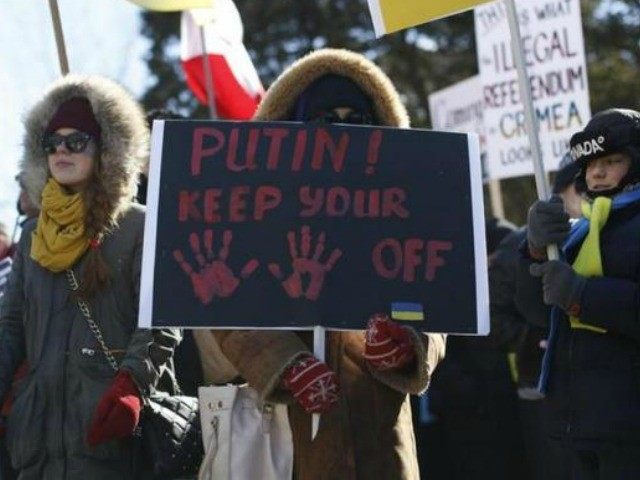This morning’s key headlines from GenerationalDynamics.com
- Migrants blocked at Macedonian border sew their mouths shut
- Ukraine suspends all commercial trade with occupied Crimea
- Ukraine and Russia in tit-for-tat escalating sanctions
- Steel and other commodity prices continue to plummet
Migrants blocked at Macedonian border sew their mouths shut

An Iranian refugee with his mouth sewn shut protests the blockade of Greece’s border into Macedonia (AFP)
Seven men have sewed their mouths shut and more than a thousand Iranians, Moroccans and Pakistanis have blocked a train line on the Greek-Macedonian border, in protest against a recent decision by some Balkan countries to block certain nationalities from heading towards northern Europe.
Following on from last week’s terrorist attack in Paris, countries along the Balkan migration trail — Croatia, Serbia and Macedonia — have begun refusing to admit people of certain nationalities. In particular, they are screening all the migrants, and admitting only refugees from Syria, Afghanistan, and Iraq. People from Africa, Iran, Pakistan and Bangladesh — who collectively amount to less than 10% of the flow through the Balkans — are being called “economic migrants,” and are being trapped in limbo at the borders of Croatia, Serbia, and Macedonia.
An average of 4,750 people a day have arrived on its shores from Turkey this month, down from the October average of 6,800 but above the August daily rate of 3,500.
Macedonia is building a barrier along its southern border with Greece. Macedonia’s prime minister, Nikola Gruevski, said: “The status quo is untenable and short-term recommendations do nothing to solve the problem. Macedonia knows that the only solution is European-wide expanded cooperation, real-time exchange of information and additional support so that we may ensure appropriate security and humanitarian outcomes for all involved.” Guardian (London) and Kathimerini (Athens) and Washington Post and Guardian (19-Nov)
Ukraine suspends all commercial trade with occupied Crimea
As we reported yesterday, transmission towers (pylons) carrying electricity lines from Ukraine to occupied Crimea were sabotaged and blown up over the weekend, most likely by Ukrainian nationalists from the far-right party Right Sector or Crimean Tatars opposed to Russia’s invasion, occupation and annexation of Crimea. The result is that most of the 2 million people living in Crimea are now living in darkness.
Ukraine’s Ministry of Energy and Coal Industry had promised a restoration within four days, but Tatars and nationalists are preventing construction workers from approaching the pylons to repair them.
On Monday, Ukraine’s government in Kiev said that it was suspending all commercial trade with occupied Crimea. This is being described as a major concession to the nationalists, since nationalists have been since September blockading the roads between Ukraine and Crimea, attempting to prevent any commercial trade.
Since September, prices for food have been rising sharply because of the blockade, and are now expected to rise much higher. It is now not known how long it will be before electricity will be restored. BBC and Tass (Moscow)
Ukraine and Russia in tit-for-tat escalating sanctions
Monday’s announcement by Ukraine’s announcement that it is suspending all cargo traffic to and from occupied Crimea is part of a lengthy sequence of tit-for-tat sanctions.
- After Russia’s army invaded, occupied and annexed Crimea, the West imposed economic and financial sanctions on Russia, making it almost impossible for Russia’s banks to borrow money.
- Russia retaliated its own sanctions — a sweeping ban on food imports from numerous Western countries, including the U.S., the European Union, Australia and Norway.
- Ukraine announced that it would implement a free trade agreement with the European Union, beginning in January 2016.
- Russia accused Ukraine of undermining Russia’s sanctions on Europe. If Ukraine and the EU have a free trade agreement, then EU food producers would sell Ukrainian distributors, who would then sell into Russia, completely voiding the sanctions imposed by Russia.
- Therefore, Russia announced an embargo on food imports from Ukraine, also to begin in January.
- This brings us to the latest announcement: Ukraine is suspending all commercial trade with occupied Crimea, in retaliation for Russia’s announced food embargo.
According to Ukraine’s Prime Minister Arseny Yatsenyuk:
Speaking about the embargo, I would like to make it clear that Russian threats to introduce an embargo on Ukrainian goods will face the same response from the Ukrainian authorities.
“There will be an analogous Ukrainian decision to launch an embargo against Russia to every Russian decision to launch an embargo against Ukraine.
However, Yatsenyuk says that he has ordered that the sabotaged electricity transmission lines be repaired, and that electricity supplies to Crimea be restored. Russia Today and Zik (Ukraine)
Steel and other commodity prices continue to plummet
Commodity prices in general have been plummet, mainly thanks to a slowdown in China, but steel prices have been particularly hard hit, falling more than a third so far this year.
China produces 800 million tons of steel a year — four times more than any other country has ever produced. But the sector is in severe overcapacity of some 400 million tons as construction has been slowing. Steel consumption in China hs fallen 5.7% in the first ten months this year. Iron ore is also trading at an all time low. There is little upside on the horizon.
According to one analyst:
A lot of [steel production] growth is completely artificially, supported by government policies and subsidies so it’s natural to see that sector shrink.
According to another analyst, China is pushing production up to create jobs. They “look more at employment and stability in the social environment,” and do not worry about the long term effects. CNBC
KEYS: Generational Dynamics, Greece, Macedonia, Serbia, Croatia, Iran, Syria, Afghanistan, Africa, Pakistan, Bangladesh, Nikola Gruevski, Arseny Yatsenyuk, Ukraine, Crimea, Right Sector, European Union, Australia, Norway, China
Permanent web link to this article
Receive daily World View columns by e-mail

COMMENTS
Please let us know if you're having issues with commenting.